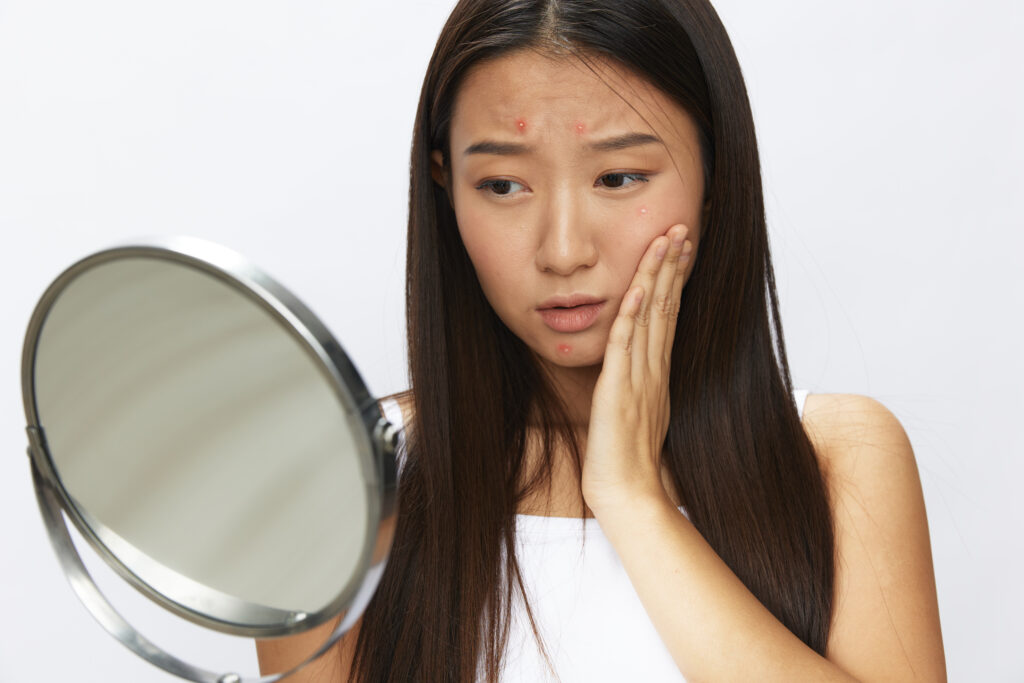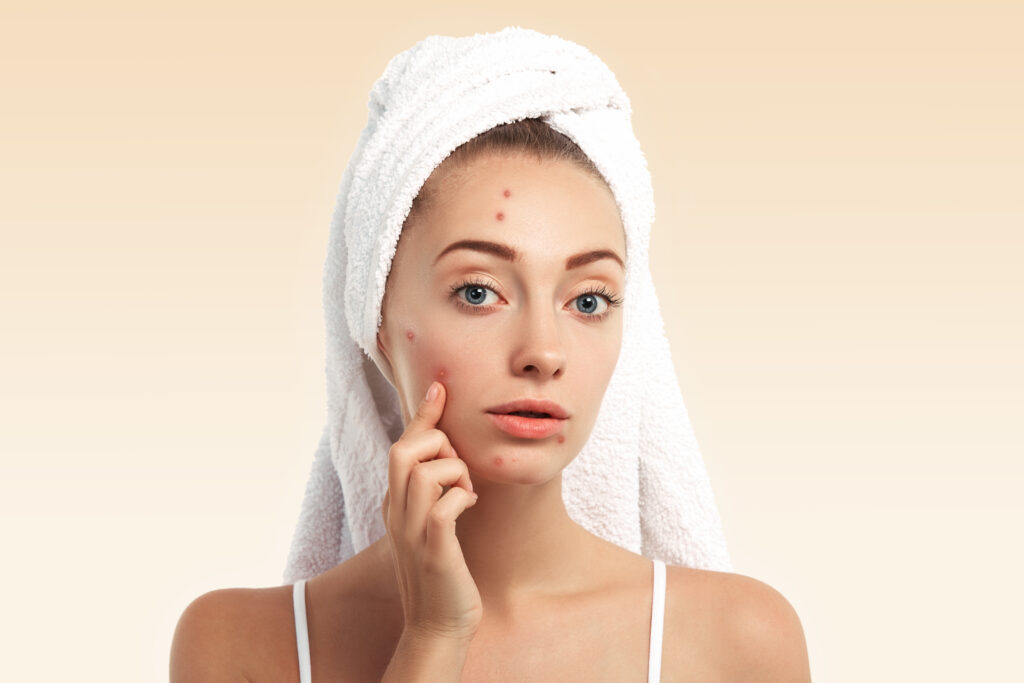Introduction
At some age, we all face issues like pimples and acne, which make us anxious and stressed. The severity of the situation is exacerbated when it occurs immediately before a significant event; however, persistent eruptions are equally detrimental. It is time to overcome their repulsive nature, which harms your self-esteem and confidence. By the time pimples and acne disappear, you can get clear skin. In this post, we will dig out the difference between acne and pimples. Here we go!
What is Acne?

What is Acne? Acne is a skin condition that occurs when the pores of the skin become clogged with excessive oil. It can lead to the development of pimples,blackheads, whiteheads, and occasionally cysts or nodules. Acne commonly appears on the face, forehead, chest, upper back, and shoulders. Various factors can contribute to its onset, including hormonal changes, specific medications, dietary choices, stress levels, and genetic predisposition. Acne can impact people of all ages, although it seems in teenagers.
What are Pimples?

Pimples are tiny, pruritic lesions on the skin that result from excessive sebum production and obstructed pores. The symptoms may manifest as tenderness, swelling, and redness when touched. Pimples can appear on various body parts, with the face, back, and chest being the most common areas. Pimples can affect individuals of all age groups, not just teenagers. Various treatment options are available for pimples, including over-the-counter creams, prescription medications, and positive lifestyle changes such as following ahealthy diet and adopting good skincare habits.
Acne vs Pimples: Key Differences
Understanding the distinction between acne vs pimples is important. Pimples are a symptom of a condition, while acne encompasses the condition as a whole. Individuals with acne-prone skin may encounter pimples due to their condition.
Still, it’s important to note that not everyone who experiences the occasional pimple has acne-prone skin. Acne is a long-term skin condition that involves blocked pores, inflammation, and occasionally scarring. On the other hand, pimples are temporaryblemishes that can occur due to various factors like hormonal changes, stress, or poor skincare habits.
Acne Causes
Although the precise acne causes have not been definitively discovered, it has been shown that several factors may function as triggers or exacerbate acne, such as:
- Hormonal fluctuations, such as those that occur during puberty, pregnancy, and the menstrual cycle
- Manipulating or extracting already present pimples
- Excessive abrasion of the skin while washing or scrubbing
- Pressure may be exerted on the body by items such as collars, headgear, helmets and backpack straps.
- Highmoisture levels
- Cosmetics, including oil-based products, sunscreen, and hair products.
- Pharmaceutical substances, such as corticosteroids and anabolic steroids
The National Institute of Skin Diseases states that the commonly held notions that stress and unclean skin are responsible for causing acne are not accurate.
Moreover, the use of fatty meals and chocolate does not often result in the development of acne for most individuals.
Pimple Causes
Pimples are formed when a pore becomes blocked. This phenomenon arises when an excessive amount of oil, dead skin cells, and germs become stuck in a small opening in the skin, resulting in irritation and the creation of an elevated swelling on the skin surface. Here are the main pimple causes:
- increased sebum production.
- Abnormal formation of keratin.
- Increased presence of bacteria on your skin.
- Hormonal changes.
Symptoms of Acne
How does acne-prone skin look? If you have acne-prone skin, you might notice many pimples and inflamed lesions across your face, back, or neck . Acne lesions can vary in appearance, sometimes raised or deep under the skin. They may also be accompanied by redness and inflammation. Acne-prone skin can be pretty sensitive to the touch. Finally, one important distinction between pimples and acne-prone skin is the long-lasting nature of the condition. Acne-prone skin often experiences blemishes that can be stubborn and recurring.
Symptoms of Pimples
What does a pimple look like? The primary signs of a pimple are a superficial lesion without any inflammation and a white or black head. Swelling, erythema, or tenderness should be minimally present, and the blemish will be either flat or minimally raised. You probably have acne-prone skin if you’re having symptoms that last longer than those described here and are more severe.
Treatment Options For Acne & Pimple
Dealing with acne and pimples is irritating, but before going for the treatment, one must understand the acne vs. pimple difference and be aware of the best treatment options that can help acne-free skin. Acne encompasses various skin issues such as blackheads, whiteheads, pimples, and cysts. Pimples are specific inflamed spots that occur when hair follicles get clogged with oil and dead skin cells.
Treatment Options for Acne & Pimples
1. Topical Treatments
- Benzoyl peroxide is a widely used ingredient found in many over-the-counter products. It effectively eliminates the bacteria responsible for pimples and helps to reduce excess oil on the skin. It’s highly effective in addressing acne and pimples treatment directly.
- Salicylic acid is known for its ability to unclog pores and reduce swelling and redness, making it a great option for treating mild acne. It’s a popular choice for tackling pimple breakouts in skincare.
- Retinoids, derived from Vitamin A, are highly efficient in reducing inflammation and preventing the blockage of pores. This makes them an exceptional option for acne treatment.
2. Oral medications
- Antibiotics inhibit the growth of germs and inflammation, and they usually cause more severe acne.
- Taking particular birth control pills may help women manage their hormones and minimize acne. These medicines often given to women.
- Isotretinoin (Accutane) is a powerful treatment for severe acne. It effectively addresses all the underlying causes of acne. However, due to potential side effects, it is crucial to use this medication under the guidance of a healthcare professional.
3. Professional Procedures
- One benefit of these procedures is exfoliating the skin with chemical peels, which may help minimise acne scars and pimple treatments.
- Using lasers and light therapy is beneficial for the long-term management of acne because targeted light therapies can destroy germs and decrease inflammation.
- A dermatologist may use drainage and extraction to treat large cysts or nodules to treat painful pimples.
Tips to Reduce Acne and Pimples
- Keep your skin clean: Wash your face twice daily with a moderate cleanser to eliminate extra oil and impurities.
- Moisturise: To keep your skin moist with moisturizer without closing pores, use a lotion that isn’t comedogenic.
- Avoid touch. This keeps dirt and germs from moving from your hands to your face.
- Best SkinCare Products: Select items that say “non-comedogenic” to keep pores from clogging.
- Healthy diet: Limit sugar and dairy consumption since these might cause outbreaks.
- Manage stress: Stress may aggravate acne, so try relaxing methods like yoga and meditation.
For more detailed information on skincare for acne and pimples, visit this government resource on acne treatment. Treating acne and pimples is a process; consistency is critical to improving your skin.
Home Remedies For Acne & Pimples
Dealing with acne and pimples may be irritating, but several excellent home treatments can help.
- Tea Tree Oil: Renowned for its anti-inflammatory effects, the use of diluted tea tree oil may effectively diminish the redness and swelling associated with pimples.
- Aloe Vera: Aloe Vera is excellent for treating acne because of its calming qualities, which may help lower inflammation and encourage healing.
- Honey and Cinnamon masks: Both possess antibacterial properties that may assist in the reduction of acne.
-
Green Tea: Due to its antioxidant qualities, applying cooled green tea to the skin or utilising products containing green tea will lessen acne.
Apple Cider Vinegar: It aids in regulating the skin’s pH and may serve as a toner for skin prone to acne.
Always patch-test any remedy to avoid irritation. There are many tips that you can check here:skincare tips for acne treatment.
Prevention Tips
There are several self-care measures you may take to help prevent acne or cure and manage acne. Here’s a handful to try:
- Wash your face with warm water and a gentle facial cleanser.
- Apply noncomedogenichair products, sunscreen, and makeup.
- Do not squeeze or pick at imperfections.
- Avoid touching your face with your fingers, phone, or hair.
- Maintain a balanced diet, and avoid skim milk and foods with high glycaemic load.
Skincare Tips for Acne-Prone Skin
Skincare for pimples and acne is somewhat challenging, but fear not! With the right skincare routine, you’ll be able to manage and improve your skin in no time. Here are a few handy suggestions:
- Easy Cleaning: Just use a gentle cleanser to wash your face twice a day. Try using gentle exfoliants to avoid any potential irritation on acne-prone skin.
- Stay Away From The Sun: UV radiation from the sun may cause irritation, redness, and hyperpigmentation. Apply SPF 30 sunscreen with UVA +++ every day, wear wide-brimmed hats, long-sleeved garments, and scarves, and minimise sun exposure.
- Water is essential to sustaining life and plays a crucial role in maintaining healthy, radiant skin. Drink plenty of water every day to help cleanse your body and keep your skin looking fresh.
- Sleep is neccessary: Get 6–8 hours of beauty sleep every night. Every night, go to bed and wake up at the same time to regulate cortisol levels.
For more detailed skincare advice, check out these acne skincare tips. These tips can help keep your skin clear and healthy while effectively treating acne and pimples.
Conclusion
Understanding the difference between acne and pimples is essential for successful therapy. While both are linked, acne refers to a larger range of skin diseases, with pimples being a frequent sign.
A mix of home remedies, appropriate skincare, and expert advice may help you manage and alleviate these problems. For chronic problems, always contact a dermatologist to get a better treatment. Remember that consistency is key to having clean, healthy skin.elvety smooth skin. Made using clean, non-toxic ingredients, our products are designed for everyone…






